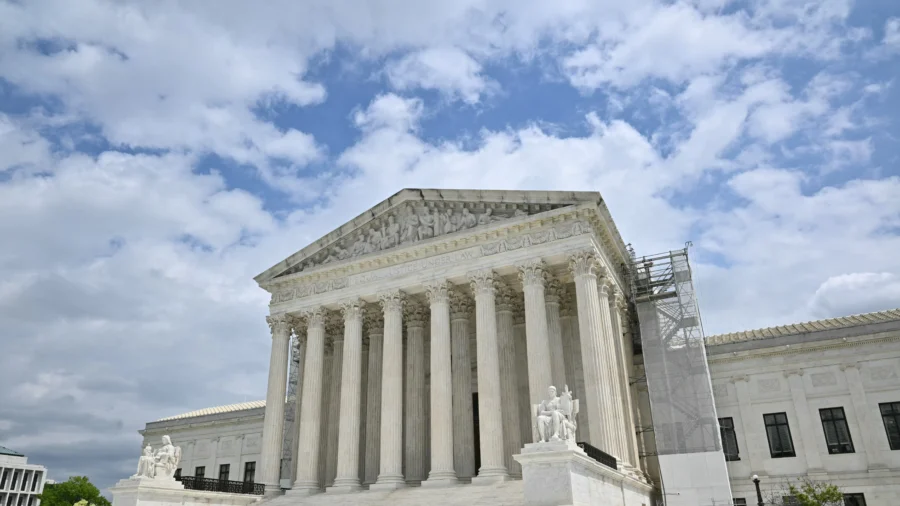The Supreme Court voted 6-3 on May 30 to overturn a lower court ruling that found that an Arizona death row inmate had received ineffective assistance of counsel during the sentencing process.
The Sixth Amendment to the U.S. Constitution guarantees a criminal defendant the right to effective assistance of counsel. At issue in this case is whether a federal appeals court properly weighed the mitigating and aggravating evidence regarding the inmate before ruling that respondent Danny Lee Jones was prejudiced by ineffective counsel during sentencing.
The hearing comes after the Supreme Court cracked down on ineffective assistance from counsel claims in May 2022. In Shinn v. Ramirez, the court held 6–3 that federal courts reviewing inmate cases may not conduct evidentiary hearings to fully examine ineffective counsel claims that should have been raised in state court proceedings.
Justice Samuel Alito wrote the new majority opinion in Thornell v. Jones, finding that the U.S. Court of Appeals for the Ninth Circuit misapplied the law. All three liberal justices dissented.
The case goes back to March 1992, when Mr. Jones was visiting his friend, Robert Weaver.
Mr. Jones and Mr. Weaver had been using methamphetamine and drinking in Mr. Weaver’s garage in Bullhead City, Arizona when an argument began.
Mr. Jones attacked Mr. Weaver from behind, hitting him in the head with a bat. He also attacked Mr. Weaver’s grandmother, but she survived. Mr. Weaver’s 7-year-old daughter, Tisha, hid in a bedroom, but Mr. Jones found her and struck her twice in the head, then either strangled or suffocated her with a pillow, according to court documents.
After the child died, Mr. Jones stole Mr. Weaver’s gun collection, grabbed the keys to the grandmother’s car, went to the garage, found Mr. Weaver, and again hit him, this time until he died. After putting the firearms in the car, Mr. Jones fled.
The public defender assigned to Mr. Jones’s case had been an attorney for three years but had never been lead attorney in a capital case. Mr. Jones was convicted of killing Mr. Weaver and his daughter and for the attempted murder of the grandmother.
Following the convictions, the public defender visited Mr. Jones’s mother and second stepfather in the search for potentially mitigating evidence for the sentencing hearing.
At the sentencing hearing, the attorney presented testimony from an investigator and the stepfather. The investigator testified about an accomplice allegedly involved in the crimes. The stepfather testified that Mr. Jones’s mother gave birth to Mr. Jones when she was 15 years old and had complications during the pregnancy and delivery.
He also said Mr. Jones had experienced several head injuries when he was growing up and that his personality began to change drastically when he was 13 or 14 years old. Mr. Jones began lying, skipping classes at school, drinking, and using drugs. His first stepfather had introduced him to marijuana when he was about 10 years old, and by the time he was 17, he was an alcoholic.
But in December 1993, Mr. Jones was sentenced to death.
The Ninth Circuit previously ordered that Mr. Jones be given a new sentencing hearing, but the Supreme Court overturned that decision in 2011.
A federal district court denied Mr. Jones’s claim of ineffective assistance of counsel during the sentencing process.
Then, last year, a divided Ninth Circuit applied the standards laid down by the Antiterrorism and Effective Death Penalty Act of 1996 and reversed that decision, without giving deference to the district court’s detailed factual findings. The circuit court held that Mr. Jones’s sentence may have been different if his lawyer had produced evidence that his medical problems had left him mentally impaired.
The legal issue here was whether the Ninth Circuit violated the Supreme Court’s 1984 ruling in Strickland v. Washington, which held that to make out a claim for ineffective counsel, it must be shown that the defense attorney was objectively deficient and that there was a reasonable likelihood that a different outcome would have followed if a competent attorney had represented the accused person.
This is a developing story. This article will be updated.
From The Epoch Times

